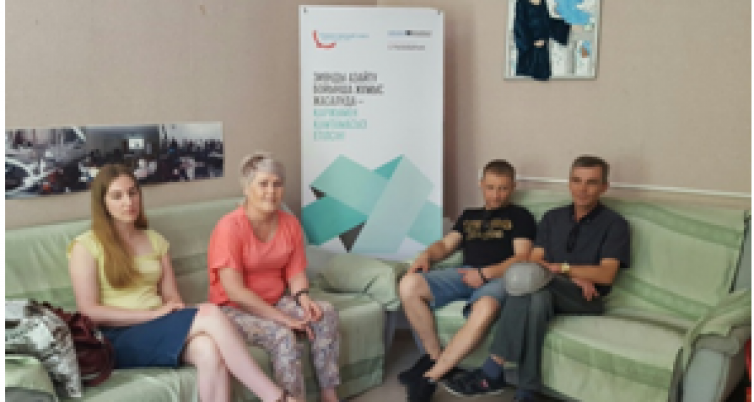Подпишитесь на наши новости:
Success Stories
другие Success Stories
Better Business Benefits All
PARENT GROUPS PROMOTE FAMILY ‘VICTORIES’

March 16, 2017
GGIF project “Hepatitis – Minus” shows the path to better health
Community organization “Kuat” is partnering with the Ministry of Health to ensure that every citizen of Kazakhstan has access to the information and support they need to live a full and healthy life.
As many as half a million citizens of Kazakhstan[1] are living with Hepatitis, a contagious liver disease which can lead to life-long complications if not properly treated. Treatment for the disease is available free of charge through a government program, yet too many citizens are unable to overcome bureaucratic barriers to access treatment, putting them at risk for long-term health problems and uncontrolled transmission of the disease.
When Elena, 32, was diagnosed with Hepatitis C in 2014, she didn’t know where to turn for support. “At the hospital I asked who I could talk to and where I could go for treatment, but I couldn’t get a clear answer. Fortunately, I met activists from the community organization “Kuat”, who told me that there is a way out of my situation. It turns out that they work with the USAID/EFCA project “Hepatitis – Minus”.
The goal of project “Hepatitis Minus” is to reduce the prevalence of Hepatitis C through advocacy for changes in the public service delivery system in East Kazakhstan Oblast. The project includes training for health service provisions, a large-scale community awareness-raising campaign, as well as informational workshops, counseling, and legal assistance for people affected by HIV.
“[“Kuat”] convinced me that hepatitis is treatable, and that I could still live a full life,” says Elena. “At that time I wasn’t able to receive free treatment, but I also couldn’t afford expensive therapy on my own. Thanks to the project, I was able to receive consultations and treatment for this disease at no cost.”
The project targets members of society’s most vulnerable groups, who are at high-risk for stigma and discrimination in service provision. Alexander, 35, did not receive treatment for his Hepatitis even after he was diagnosed. “When I found out that I had Hepatitis C, I was immediately denied free treatment because I was an intravenous drug user. Three years flew by this way! My “unsolvable” problem, as many called it, was actually easily solved. Some acquaintances introduced me to the team from the community organization “Kuat”, and they told me about the project in East Kazakhstan, USAID/EFCA’s “Hepatitis Minus”. It is only thanks to the activists on the project and their work that I was able to receive free treatment. Now I am completely healthy – I don’t have hepatitis. A huge thank you to the project and the people that support it!”
“Kuat” has also partnered with the Ministry of Health of Kazakhstan to establish a new working group on Hepatitis issues, which will promote greater coordination of regional and national prevention and treatment efforts. The Ministry of Health has also demonstrated interest in the development of a Road Map for Fighting Hepatitis in Kazakhstan.
The organization is also planning to create a public fund for Hepatitis C in order to help more people like Elena and Alexander receive support and assistance. The organization recently launched a new website on the disease, www.hepatit.kz, to ensure that information is widely accessible to the public.
[1] 2015 estimate, “Hepatitis C in Eastern Europe and Central Asia”, Alliance Centre for HIV, Hepatitis C and Drug Use www.aidsalliance.org.ua/ru/news/pdf/...2015/EECA%20HCV%20EN.pdf



